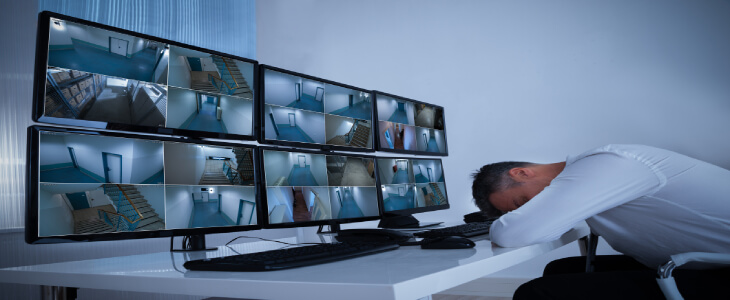Crime is a fact of life, and one of our biggest fears is that we or a loved one may someday fall victim to it. What if the crime could have been prevented? This is where the concept of negligent security enters the picture. When someone becomes a victim while visiting a place of business or other private property, it must be determined whether the property owner could have done something to prevent the crime from happening. The premise liability attorneys of Cooper Schall & Levy represent victims whose injuries might have been avoided if proper security measures were in place. Our personal injury attorneys also represent the families of victims who lost their lives in this type of avoidable tragedy.
What Is Negligent Security?
Negligent security is the failure of a business or private property owner to provide adequate and reasonable security for guests, customers, and other visitors. Property owners are required, under rules of premises liability, to keep their property reasonably safe. This includes safety from third-party criminal acts when said criminal acts were foreseeable to the property owner.
This rule is especially relevant for places located in high crime areas and for businesses that are frequently targeted by criminals. While nothing can absolutely guarantee that you won’t become a victim, these properties have to implement security measures to protect their customers and guests. When a landowner fails to do so, serious injury or death can result.
Property owners are also liable for negligent security if they should have known about safety risks. In other words, the owner cannot claim to be ignorant of obvious dangers to guests and visitors.
Who Can Be Liable for Negligent Security?
The owners of public places such as shopping malls and private places like apartment complexes can be liable for negligent security. The duty to maintain reasonably safe premises applies to other parties, including:
- Commercial landlords
- Hotels
- College Campuses
- Property management companies
- Security guards
- Security agencies
- Cleaning and maintenance contractors
- Bars
- Restaurants
- Parking lot and parking deck owners
After someone is hurt at a business or on private property, it’s important to know everyone who had access to, or responsibility for, security and safety at the property. This will help determine which party may be held liable for injuries.
What Are Some Examples of Negligent Security?
Common examples of negligent security include the following:
- A fight at a bar gets out of control and hurts innocent bystanders
- A customer is assaulted while walking to his/her car in a business’s parking lot
- A resident of a condominium is sexually assaulted
- An unruly fan is kicked out of a concert but returns to assault other visitors
In these and other instances, poor security unnecessarily allowed people to be victimized. Remember, a business or property owner has no obligation to ensure the absolute safety of its guests and visitors. But it is required to take reasonable steps to protect guests and visitors from foreseeable harm.
What Are Common Causes of Negligent Security?
A business can fail to have adequate security by taking, or not taking, a variety of actions. These include:
- Malfunctioning equipment — This includes lighting, locks, gates, and alarm systems. Failure to inspect and maintain security systems is a contributor to this.
- Inadequate equipment — Although a business may maintain properly functioning equipment, it may not be enough for the circumstances. For example, the lighting in a parking lot may be insufficient and allow a criminal to easily lie in wait for a customer.
- Failure to respond to incidents — After a crime is reported near a business or other property, the owner should take reasonable precautions. Not doing so is irresponsible and puts customers and visitors at risk of future incidents.
- Lack of security protocols — Sometimes a business or land owner doesn’t keep the premises secure because no plans were ever put in place to do so.
- Improperly trained security personnel — If a business relies on guards or other security personnel, those staff members need to understand the requirements of their job. When they are not properly trained, they won’t do their jobs correctly.
How Can Someone Be Victimized Due To Inadequate Security?
These are the common injuries and losses suffered as a result of inadequate security:
- Violent crimes – assaults, sexual assaults, shootings, stabbings, robberies, muggings
- Theft crimes – including automobiles
- Burglaries
- Stampedes and other injuries at concerts and public venues
The above list is not exhaustive. If you have suffered a loss or injury of some kind that could have been prevented, the responsible party may be liable for negligent security.
What Will I Need To Prove To Win My Case?
As with any premises liability claim, you have to demonstrate some negligent act (or omission) on the part of the responsible party. More specifically, you need to show:
- The business or property owner owed a duty of care
- The duty was breached
- The victim was harmed because of the breach
- The breach caused the victim to suffer damages
What Compensation May A Victim Receive?
In a premises liability case, your lawyer’s goal is to fight for compensation that restores you to the position you were in before suffering a loss. Depending on the facts in your case, you may be eligible for such compensation as:
- Medical expenses and costs for future medical treatments
- Lost present and future earnings
- Lost earning capacity
- Rehabilitation costs
- Pain and suffering and emotional trauma
- Wrongful death (in the event a close family member was killed)
Contact Our Philadelphia Negligent Security Attorney
When businesses and property owners cut corners or refuse to protect their visitors and customers, innocent people can be hurt. If you’re a victim of negligent security, you deserve aggressive legal representation. Contact Cooper Schall & Levy today so our capable negligent security lawyers can get started on your case.
Cooper Schall & Levy personal injury lawyers serve Philadelphia, Pennsylvania as well as neighboring counties such as Montgomery County and Delaware County and cover neighborhoods such as Norristown and Drexel Hill.


